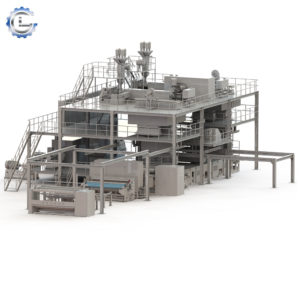The use of stainless steel in the construction of PP (Polypropylene) nonwoven machines offers several advantages, making it a preferred material for various components.
Here are the key advantages:
- Corrosion Resistance:
- Stainless steel is highly resistant to corrosion, making it well-suited for applications in nonwoven machines that involve exposure to moisture, chemicals, and other corrosive elements. This corrosion resistance ensures the longevity and durability of machine components.
- Hygienic Properties:
- Stainless steel has hygienic properties that are crucial in applications where cleanliness and hygiene are essential, such as in the production of nonwoven fabrics for medical or food-related purposes. Stainless steel surfaces are easy to clean and maintain, minimizing the risk of contamination.
- High Strength and Durability:
- Stainless steel exhibits high strength and durability, providing structural integrity to components of nonwoven machines. This is particularly important in the construction of critical parts like frames, rollers, and structural supports, where strength and robustness are essential.
- Resistance to High Temperatures:
- Nonwoven fabric production processes, such as melt spinning and thermal bonding, involve high temperatures. Stainless steel maintains its mechanical properties and structural stability at elevated temperatures, ensuring the reliability of machine components during heat-intensive operations.
- Low Maintenance Requirements:
- Stainless steel is known for its low maintenance requirements. It is resistant to rust, staining, and corrosion, reducing the need for frequent maintenance or replacements. This results in cost savings and increased operational efficiency over the long term.
- Ease of Cleaning:
- The smooth and non-porous surface of stainless steel makes it easy to clean and sanitize. This is advantageous in industries where cleanliness is critical, as it helps prevent the buildup of contaminants and ensures the production of high-quality nonwoven fabrics.
- Chemical Compatibility:
- Stainless steel is compatible with a wide range of chemicals and cleaning agents. This compatibility is essential in environments where exposure to chemicals is common, such as in the production of nonwoven fabrics with specific chemical treatments or additives.
- Aesthetic Appeal:
- Stainless steel has a sleek and modern appearance, contributing to the overall aesthetic appeal of nonwoven machines. china pp nonwoven machine This is important for industries where equipment visibility is a factor, and a clean and professional appearance is desired.
- Recyclability:
- Stainless steel is a recyclable material, aligning with sustainability goals. At the end of its service life, stainless steel components from nonwoven machines can be recycled, reducing environmental impact and promoting a circular economy.
- Dimensional Stability:
- Stainless steel exhibits excellent dimensional stability under various environmental conditions. This property ensures that machine components maintain their shape and dimensions, contributing to the precision and accuracy of nonwoven fabric production.
- Compliance with Industry Standards:
- Stainless steel often complies with industry standards and regulations, ensuring that nonwoven machines meet specific quality and safety requirements. Compliance enhances the reliability and performance of the equipment.
In summary, the advantages of using stainless steel in the construction of PP nonwoven machines include corrosion resistance, hygienic properties, high strength, resistance to high temperatures, low maintenance requirements, ease of cleaning, chemical compatibility, aesthetic appeal, recyclability, dimensional stability, and compliance with industry standards. These advantages collectively contribute to the efficiency, longevity, and quality of nonwoven fabric production processes.
